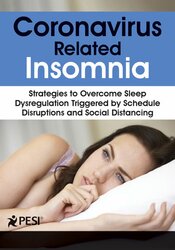The unparalleled upending of every aspect of our lives that has been thrust upon all of us by the novel coronavirus represents a major stressor that can take a toll both physically and mentally. A toll on sleep will be no exception. This can happen because of increased stress and anxiety, but also because of major changes to the regularity of schedule and the overall rhythms of our lives. Change in work schedules, bedtime routines, activity level, and perhaps even light exposure can wreak havoc with normal sleep regulation. This in turn will then impact our energy, concentration, mood, and ability to cope.
Perhaps more concerning is that the coronavirus, and our attempts to deal with it (social distancing, working from home, homeschooling children, etc.), will likely go on for a while. What we know from the Behavioral Sleep Medicine literature is that when acute insomnia is maintained by ongoing factors, a shift takes place in which the individual begins to focus, in part, on the insomnia itself as a threat. This in turn leads to behavioral and cognitive changes that further dysregulate sleep and can turn into a chronic form of insomnia that will not resolve without targeted treatment. This Insomnia Disorder is widely recognized to be the most common of all sleep problems and is also a leading complaint in primary care settings. Left unresolved, the consequences and morbidity associated with chronic insomnia can be substantial across several domains and can include increased health care utilization, impaired quality of life, increased risk of medical and psychiatric disorders, and ultimately worse outcomes for all co-morbid disorders. So while we will eventually get to the other side of this pandemic, Insomnia Disorder may continue on long after the rest of life returns to normal.
This recording is designed to provide clinicians with an understanding of the factors that cause insomnia to evolve from a normal reaction to stress to a chronic condition that adversely impacts every aspect of your patients’ lives. In addition, we will discuss some simple strategies that your patients can employ now to avoid a chronic sleep problem in the long run.
